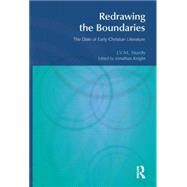Redrawing the Boundaries: The Date of Early Christian Literature
, by Sturdy,J. V. M.; Knight,Jonatha- ISBN: 9781845533014 | 1845533011
- Cover: Hardcover
- Copyright: 8/19/2014
John Sturdy's unfinished book was conceived as a reply to John Robinson's Redating the New Testament, published in 1975. The once-liberal Bishop of Woolwich took a much too conservative stand towards the end of his life, Sturdy believed, when it came to dating the New Testament literature. Where Robinson tended to date all the New Testament material very early, Sturdy took a much more radical view which began from the attempt to examine the so-called fixed points of New Testament scholarship. Sturdy came to a view which saw the genuine Pauline letters as in places interpolated; regarded Colossians, Ephesians and the Pastorals as pseudonymous; identified a divorce in authorship between Luke and Acts; and believed Matthew the last of the Synoptic Gospels to be written, with John assigned to the period c.140 CE. The lynchpin of Sturdy's argument is his view that the Ignatian letters are pseudonymous and were written towards the end of the second century CE. For Sturdy, this removed the need to set other texts impossibly early given the knowledge that the Ignatian letters show of the New Testament material. Thus he sets the Johannines, 2 Peter and Revelation c.150 CE, along with the Didache; and concluded that John 21 was not written until 160 CE. Sturdy's book is required reading for New Testament scholars for two related reasons. First of all, it states a radical case in a research environment which has become increasingly conservative. Secondly - and most importantly - it shows that this radicalism is not merely his own aberration but stands in a long tradition of scholarship represented in Germany by the Tuebingen School and its successors, and in England by Davidson and Bishop Barnes. The book is richly documented with extensive references to secondary literature, and serves as an indispensable research compendium for that reason.







